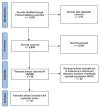Surveillance of clinical research integrity in medically assisted reproduction: a systematic review of retracted publications
- PMID: 37588117
- PMCID: PMC10427242
- DOI: 10.3389/fpubh.2023.1210951
Surveillance of clinical research integrity in medically assisted reproduction: a systematic review of retracted publications
Abstract
Background and purpose: Retraction is a significant consequence of scientific research, resulting from various factors ranging from unintentional errors to intentional misconduct. Previous reviews on retracted publications in obstetrics and gynecology have identified "article duplication," "plagiarism," and "fabricated results" as the main reasons for retraction. However, the extent of retracted articles in the literature on medically assisted reproduction (MAR) remains unclear. This systematic review aimed to assess the number and characteristics of retracted articles in the field of MAR.
Methods: The Preferred Reporting Items for Systematic Reviews and Meta-Analyses (PRISMA) guidelines were followed for this study. A comprehensive literature search was conducted on the PubMed database from 1993 to February 2023, limited to English articles and including all 283 terms from the International Glossary on Infertility and Fertility Care. To identify retracted studies, a specific query combining the 283 terms from the glossary with a retraction-related keyword was used. Only studies focused on MAR and involving human subjects were included.
Results: The electronic search yielded a total of 523,067 records in the field of infertility and fertility care. Among these, a total of 2,458 records were identified as retracted. The citation retraction rate was found to be 0.47% (2,458/523,067; 95%CI 0.45-0.49), and the citation retraction rate for randomized controlled trials (RCTs) was 0.20% (93/45,616; 95%CI 0.16-0.25). A total of 39 retracted articles specifically related to MAR were identified. Among these, 41.0% were RCTs (n = 16), 15.4% were reviews (n = 6), and 10.3% were retrospective studies (n = 4) or prospective studies (n = 4). Most of the retractions occurred shortly after publication, with "plagiarism" being the most common reason for retraction, followed by "duplicate publication."
Discussion: The issue of retraction exists within the field of infertility and fertility care, including MAR. Our findings indicate that scientific misconduct, particularly plagiarism and duplicate publication, are the primary causes of retraction in MAR. Despite finding that the proportion of retracted citations is low, promoting scientific integrity should be a priority. The consequences of article retractions have significant implications for patient care and the scientific community. Hence, it is crucial to prioritize thorough screening of manuscripts before publication to maintain research integrity.
Systematic review registration: https://www.crd.york.ac.uk/prospero/display_record.php?RecordID=185769, PROSPERO, identifier: CRD42020185769.
Keywords: MAR; article retraction; medically assisted reproduction; research integrity; research misconduct.
Copyright © 2023 Minetto, Zanirato, Makieva, Marzanati, Esposito, Pisaturo, Costa, Candiani, Papaleo and Alteri.
Conflict of interest statement
The authors declare that the research was conducted in the absence of any commercial or financial relationships that could be construed as a potential conflict of interest.
Figures
References
-
- Committee on Publication Ethics (COPE) Guidelines: Retraction guidelines. (2019). Available online at: https://publicationethics.org/sites/default/files/retraction-guidelines-... (accessed April 1, 2023).
Publication types
MeSH terms
LinkOut - more resources
Full Text Sources
Medical



